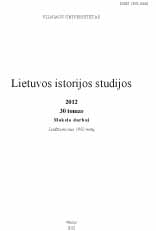LIETUVOS TAUTINĖS MAŽUMOS, VALSTYBĖ IR VISUOMENĖ XX–XXI AMŽIŲ SANDŪROJE
Ethnic minorities, State and Society in Lithuania in the late 20th and early 21st century
Author(s): Algis Povilas Kasperavičius, Petras BiveinisSubject(s): Social Sciences
Published by: Vilniaus Universiteto Leidykla
Summary/Abstract: The paper deals with ethnic relationships in Lithuania between 1992 and 2004. The publication builds on the earlier paper on ethnic relationships in Lithuania between 1988 and 1992, published in the Studies of Lithuania’s History, Vol. 20. The authors of the article point out that Lithuania has developed a legal body favourable for the protection and enforcement of ethnic minority rights. The Republic of Lithuania was successful in implementing documents ensuring the protection of ethnic minority rights in accordance with international standards. The authors discuss the activities of the Department of Ethnic Minorities and Emigration under the Government of the Republic of Lithuania and other local and management authorities implementing the national policy on ethnic minorities. Lithuania has created favourable conditions for ethnic minorities to develop their culture and education, to foster their traditions, confess their religion, and establish their own cultural and public organisations. However, cases of ethnic strife persist. Ethnic discord was caused by manifestations of antisemitism or mass media publications. Considerable issues surrounded the decisions on the way of writing Polish place names and surnames in passports. The integration of Russian Lithuanians into local society was quite successful, while many of the Poles chose to stay detached from the ethnic majority. Despite the implementation of the Government programme and various projects and other efforts, the situation of Roma remains complicated: the integration of the community members into society is slow. According to the authors, the studies of causes behind ethnic disagreements remain relevant, and prevention measures need to be taken in this field. The interethnic and intercultural dialogue should be cultivated through education and a deeper understanding of cultural life of ethnic minorities, particularly emphasising the crimes of holocaust and mass terror carried out by totalitarian regimes, and explaining the complex problems of Lithuania’s history and relationships with the neighbouring countries.
Journal: Lietuvos istorijos studijos
- Issue Year: 2012
- Issue No: 30
- Page Range: 150-170
- Page Count: 21
- Language: Lithuanian

